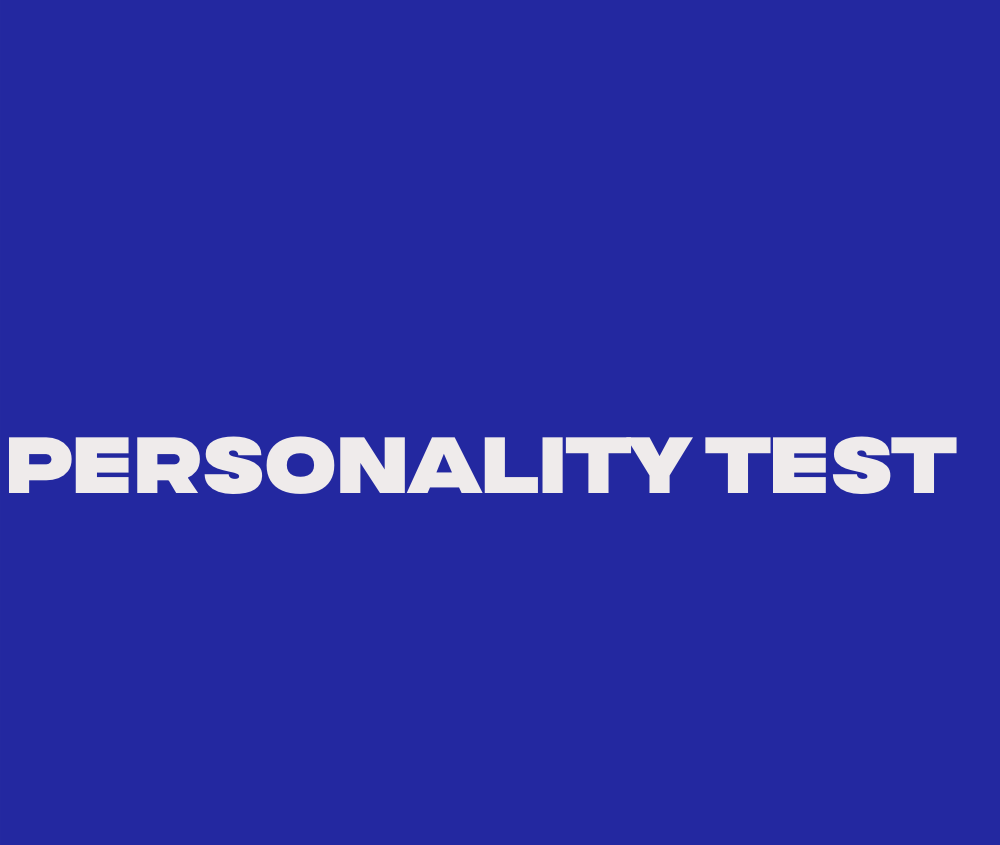Relationships Insights
Does He Want to Be Your Boyfriend? Here's How to Find Out
Intrigued to know if he wants to be your boyfriend? Uncover the secret signs that reveal his true intentions.

Were you aware that a recent poll indicates over 60% of people find it challenging to discern whether their romantic partner is interested in advancing their relationship? Deciphering another’s intentions isn’t easy, however, don’t worry—we’ve put together an exhaustive guide to assist you in maneuvering through these murky waters.
By observing subtle cues and behaviors, you may uncover valuable insights that could shed light on whether your partner sees a future with you. So, let's unravel the mystery together and discover the signs that reveal his true feelings.
Key Takeaways
- Look for signs of interest like quality time and meeting family.
- Analyze interactions including family involvement and social media portrayal.
- Pay attention to future plans and discussions about long-term goals.
- Assess his behavior, respect, commitment, and integration into your life.
Signs of His Interest
Noticing subtle signs of his interest in you can provide valuable insight into his feelings and intentions. If a guy wants to take things to the next level and is interested in a serious relationship, he'll show it through his actions.
One of the key signs he wants to be more than friends is when he invests time in spending quality time with you. This could involve planning future activities together and prioritizing your company in his schedule. By showing a genuine interest in your life, asking about your interests, and remembering details you've shared, he's demonstrating that he values you and wants to build a deeper connection.
Additionally, when a guy introduces you to his family and friends, it signifies that he sees a future with you and is open and honest about his intentions. Complimenting you and boosting your self-esteem are also signs that he cares about you and wants to make you feel special.
Actions speak louder than words, and by observing how he treats you and includes you in his life, you can gain insights into his true feelings.
Analyzing Your Interactions

When analyzing your interactions with a guy you're interested in, focus on how he consistently initiates contact and makes plans with you. This can be a strong indicator of his interest and investment in the relationship. Here are some key points to consider:
- Signs He's Ready: Look for signs that show he's serious about you, such as making an effort to spend quality time together and prioritizing important things in your life.
- Relationships with Your Family: Pay attention to how he interacts with your family and how open he's to building relationships with them. This can indicate that he sees a future with you and values your family unit.
- Social Media Presence: Take note of how he portrays your relationship on social media. Does he make you feel special and cherished in his online presence? This can be a subtle yet telling sign of his commitment to you.
His Future Plans and Goals
Observing how he incorporates you into his future plans and openly discusses his long-term goals can offer valuable insight into his commitment and seriousness towards building a lasting relationship with you. It's essential to pay attention to whether he seeks your opinion on important decisions and values your input in his life. Look for signs that he's making efforts to align his future aspirations with yours and considers you a part of his life moving forward.
Evaluate how open and transparent he's about his future intentions and how willing he's to share them with you. Consider whether he takes steps to actively involve you in his plans and shows a desire for a committed, long-term relationship with you. By sharing his intentions, seeking your opinion, and including you in his future plans, he demonstrates a level of commitment and a genuine interest in building a future together. This transparent approach sets the foundation for a strong and meaningful connection based on shared values and mutual respect.
Assessing His Behavior and Respect
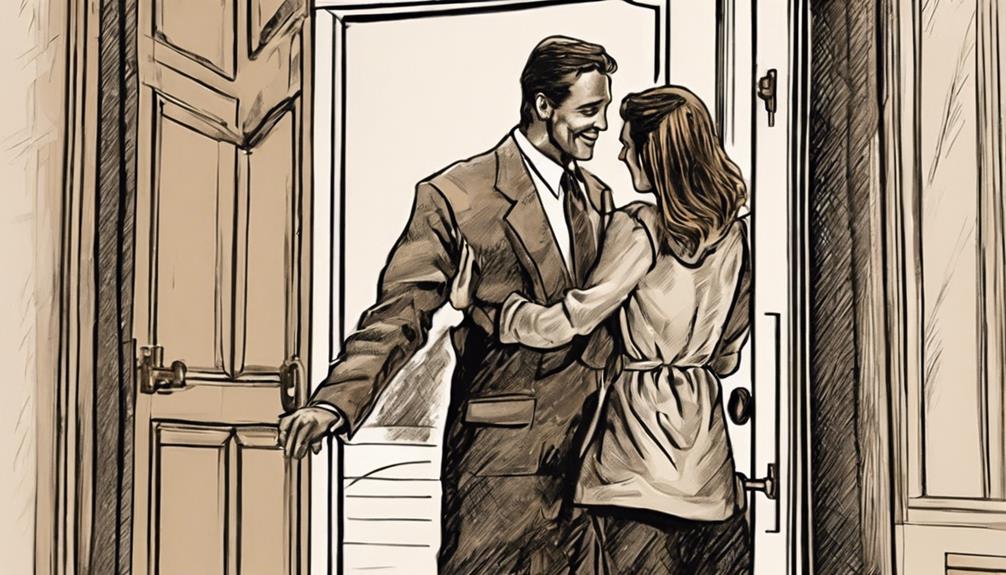
In understanding his intentions and level of commitment, it's crucial to assess how he demonstrates respect through his behavior towards you. Here are three key ways to evaluate his behavior and respect:
- Respecting Boundaries and Values: Take note of how he acknowledges and respects your boundaries and values. A partner who genuinely cares about you'll prioritize your comfort and boundaries, showing a high level of respect and consideration.
- Integration with Friends and Family: Look for signs of integration into each other's lives by observing if he introduces you to his friends and family. This step indicates a willingness to merge your worlds together, which can signify a deeper level of commitment and seriousness in the relationship.
- Consistency in Communication and Interaction: Evaluate his consistency in communication and interaction with you. A partner who's serious about building a relationship will make an effort to stay in touch, be present, and engage with you consistently, demonstrating his interest and commitment.
Understanding His Commitment Level
To truly understand his commitment level, it's essential to pay attention to his actions and willingness to invest in the relationship. Look for signs of exclusivity, such as his desire to spend time only with you and not seeing other people.
Notice if he introduces you to his friends and family, as this can indicate a serious commitment. Additionally, pay close attention to his communication style. Does he talk about a future together or include you in his plans?
Evaluate his emotional investment by observing how he supports you and prioritizes your relationship. It's also crucial to have open discussions about your relationship goals and expectations. Understanding each other's commitment levels can help both of you align your intentions for the relationship.
Frequently Asked Questions
How Do You Know if a Guy Wants to Be Your Boyfriend?
If a guy wants to be your boyfriend, he'll show it through actions like exclusivity, future planning, integrating you into his circle, time investment, and discussing shared goals. Look for these signs of commitment.
How Long Does It Take for a Man to Know He Wants to Be With You?
We understand determining a man's commitment can be challenging. Typically, it takes 3-6 months for a man to decide if he wants a long-term relationship. Factors like communication and shared values play key roles in this decision-making process.
Is He Hinting at a Relationship?
When he talks about the future or includes you in his inner circle, it might be more than just hints. Look for genuine interest, commitment, and shared celebrations. His actions often speak louder than words – trust your instincts.
Is He My Boyfriend or Are We Just Dating?
We're navigating the dating phase to understand the relationship's status. Clear communication and shared expectations are key. We value mutual understanding and defining our dynamic. It's about aligning intentions and emotions to move towards a committed relationship.
Conclusion
In conclusion, understanding the signs of his interest and analyzing your interactions can give you valuable insights into his feelings and intentions. Remember, actions speak louder than words when it comes to assessing his commitment level.
Did you know that studies show that couples who openly communicate about their future plans are more likely to have a successful and long-lasting relationship? Keep this in mind as you navigate your own romantic journey.
Augustus is the visionary leader and Editor-in-Chief of Personality-Test.net. With an unwavering commitment to quality and authenticity, he oversees all content, ensuring it enlightens and empowers our audience. Augustus believes deeply in the transformative power of self-awareness and is dedicated to making Personality-Test.net a beacon for those on a journey to understand themselves better.
Relationships Insights
Responding Gracefully When Someone Calls You Lady

Did you know that being referred to as a “lady” can evoke a spectrum of feelings, from feeling empowered to feeling offended? Knowing how to react effectively when someone addresses you as a “lady” is a crucial skill that demonstrates both your self-assurance and your understanding of boundaries. In this article, we will delve into the different connotations of being called a “lady,” interpret the tone and circumstances, and offer you tips on responding gracefully.
Key Takeaways:
- Being called “lady” can carry different meanings depending on the context, tone, and relationship between the speaker and the person being addressed.
- Understanding the term “lady” in its historical and social context can help you interpret its meaning.
- Interpreting the tone of voice is crucial in understanding whether being called “lady” is intended as respect, condescension, or sarcasm.
- The role of age and relationship status can influence the interpretation of being called “lady.”
- When responding to being called “lady,” there are different possible approaches, including polite acknowledgment, clarification, and positive or neutral responses.
Understanding the Term ‘Lady’
When exploring the term “lady,” it is crucial to delve into its historical and social contexts to gain a comprehensive understanding of its modern usage. In the past, the term was commonly used to refer to women of elevated social status or those regarded as classy and refined. These women were seen as epitomizing sophistication, elegance, and grace.
Over time, the meaning of “lady” has evolved to encompass a broader spectrum. Today, it encompasses any woman who embodies maturity, politeness, and respect, regardless of her social standing. Being called a lady acknowledges not only individual characteristics but also social status and the values associated with it.
This term has undergone significant transformation, and in modern usage, “lady” is predominantly regarded as a form of respect or endearment. It is often used to address women or girls specifically, but it can also be utilized more generally to address someone of unknown gender. Furthermore, it serves as a nickname or a term of endearment, showing affection and admiration for the person being addressed.
The term “lady” holds multifaceted implications, encompassing aspects of maturity, politeness, and social status. It provides a nuanced way of acknowledging and appreciating individuals who exemplify these qualities. In the modern context, being labeled a “lady” is a recognition of the values and virtues associated with the term.
| Historical Context | Social Context | Modern Usage |
|---|---|---|
|
– Refers to women of high social status – Symbolizes elegance and refinement – Reserved for women of class and sophistication |
– Embraces the qualities of maturity and politeness – Recognizes respect and admiration – Acknowledges social status and associated values |
– Term of respect and endearment – Addressing women and girls specifically – May be used in a more general way to address someone of unknown gender |
When a Guy Calls You Lady
When a guy calls you “lady,” it can have different meanings depending on the context. In a romantic context, it could be a sign of interest or flirtation. In a non-romantic context, such as a boss or friend, it is often a term of respect or formality. Interpreting the tone is important in understanding the meaning. It can be sarcastic, serious, polite, condescending, creepy, chivalrous, or gentlemanly. Considering the context, tone, and relationship with the person using the term can help determine the intent behind it.
Interpreting the Tone
The tone of voice used when someone calls you “lady” can provide insight into the meaning behind it. A sarcastic tone may be meant as humor or teasing, while a serious tone can indicate respect or formality. Polite tones are usually signs of respect or courtesy, while condescending tones can belittle or demean. Creepy tones may indicate unwanted attention, and chivalrous or gentlemanly tones often convey respect and admiration. Considering the tone, context, and nonverbal cues can help interpret the message behind the word “lady.”
Context and Relationship
The context in which the term “lady” is used is crucial in understanding its meaning. In a romantic context, it may suggest attraction or affection. However, in a non-romantic context, such as a workplace or friendship, it is more likely to signify respect or formality. The relationship between you and the person addressing you as “lady” also plays a role in interpreting the intent. If you have a close and friendly relationship, it might be a term of endearment, while in a professional setting, it may simply be a sign of politeness.
| Context | Possible Meanings |
|---|---|
| Romantic | Flirtation, interest, affection |
| Non-Romantic | Respect, formality, politeness |
| Professional | Respect, formality, politeness |
| Friendship | Term of endearment, respect |
Interpreting the meaning behind a guy calling you “lady” requires considering the context, tone, and relationship dynamics involved. By paying attention to these factors, you can better understand the intent and respond appropriately. Whether it’s a romantic or non-romantic situation, it’s important to respect your own boundaries and communicate clearly.

When a Girl Calls You Lady
When a girl calls you “lady,” it can have various meanings. It can be a sign of respect, acknowledging your maturity or achievements. It can also be used as a polite way to address someone. However, there are instances where it may be used sarcastically, implying that you are uptight or overly formal.
The context, tone, and facial expressions of the girl can provide clues to the intended meaning. If she says it with a genuine smile and a friendly tone, it’s likely a sign of respect or politeness. On the other hand, if she uses a mocking tone or rolls her eyes, it could be intended sarcastically.
Being called a lady by a girl is usually a positive thing, indicating that she sees you as someone deserving of respect. Embrace it as a compliment and an acknowledgement of your maturity and achievements.

“Being called a lady by a girl is usually a sign of respect or politeness.”
Interpreting the Tone
The tone of voice used when someone calls you “lady” can provide insight into the meaning behind it. A sarcastic tone may be meant as humor or teasing, while a serious tone can indicate respect or formality. Polite tones are usually signs of respect or courtesy, while condescending tones can belittle or demean. Creepy tones may indicate unwanted attention, and chivalrous or gentlemanly tones often convey respect and admiration. Considering the tone, context, and nonverbal cues can help interpret the message behind the word “lady.”
When someone addresses you as “lady,” it’s essential to pay attention to their tone of voice. The way they say it can provide valuable clues about their intentions and feelings towards you. Whether it’s said sarcastically, seriously, politely, condescendingly, creepily, or in a chivalrous and gentlemanly manner, the tone sets the stage for interpreting the meaning behind the word.
Sarcastic: A sarcastic tone can indicate that the person is using “lady” as a form of humor or teasing. It’s meant to be lighthearted and not to be taken seriously. However, it’s important to consider your relationship with the person and their intentions.
Serious: When someone calls you “lady” in a serious tone, it often reflects respect or formality. They may regard you with esteem and honor your presence. It’s a sign of recognition and may be used in professional or formal settings.
Polite: Polite tones usually accompany the term “lady” as a sign of respect and courtesy. It demonstrates the person’s desire to be polite and to treat you with dignity and kindness.
Condescending: A condescending tone when using the word “lady” can be demeaning or belittling. It may indicate that the person is trying to assert their superiority or undermine your self-worth. In such cases, it’s crucial to assert your boundaries and address the disrespectful behavior.
Creepy: A creepy tone can be unsettling when someone calls you “lady.” It may imply unwanted attention or make you feel uncomfortable. If you sense a creepy undertone, trust your instincts and take appropriate measures to ensure your safety.
Chivalrous or Gentlemanly: When someone calls you “lady” with a chivalrous or gentlemanly tone, it reflects their admiration and respect for you. It’s a courteous and polite gesture, often associated with traditional values of gallantry and respect towards women.
Understanding the tone used alongside the word “lady” is essential in interpreting its meaning accurately. Be mindful of the context, nonverbal cues, and your relationship with the person to gain a comprehensive understanding of their intent and feelings.

The Role of Age and Relationship Status
Age and relationship status play a significant role in interpreting the meaning of being called “lady.”. The way individuals perceive and respond to this term can be influenced by their age and whether they are in a romantic or platonic relationship. Understanding the context is essential in comprehending the intended message behind being referred to as a “lady.” It is crucial to communicate personal boundaries and feelings clearly to ensure respectful treatment from others.

When someone addresses you as a “lady,” your age can impact how you interpret the term. Older individuals might view it as a compliment, acknowledging their maturity and life experience. Younger individuals, on the other hand, may have a different perspective, potentially associating it with notions of being formal or old-fashioned. The role of age in the interpretation of this term highlights the importance of considering generational differences and individual perspectives.
Furthermore, the relationship status between the speaker and the person being addressed can also influence the meaning of being called “lady.” In a romantic context, it can be a term of endearment or a way to express admiration. However, in a platonic relationship or a professional setting, it is often used as a sign of respect or formality.
It is crucial to recognize that individuals may have different interpretations of being referred to as a “lady” based on their age and relationship status. Therefore, understanding the context and the nature of the relationship is vital in accurately interpreting the intent behind the term.
Possible Responses
When someone calls you “lady,” it’s essential to respond in a manner that aligns with your personal values and boundaries. Here are some possible approaches:
-
Polite acknowledgment: A gracious response is to acknowledge the term with a simple “thank you.”
-
Clarification: If you’re unsure of the intent behind the term, politely ask for clarification to gain a better understanding. For example, you can say, “I appreciate the use of the term ‘lady,’ but can you help me understand the context in which you’re using it?”
-
Positive response: Show appreciation and interest in being addressed as a lady. A response like “I’m flattered that you consider me a lady” can help foster a positive connection.
-
Neutral response: In situations where you’re unsure of the meaning or context, it’s acceptable to respond neutrally. You can reply with a neutral acknowledgment, such as a simple “okay” or “got it,” as you gather more information.
Remember to consider the situation and adjust your response accordingly.
Is Lady Considered A Compliment?
Whether being called “lady” is considered a compliment depends on the context, tone, and intent behind it. Sincerity in accepting compliments is important, as they are verbal gifts that should be acknowledged and appreciated. Avoid downplaying compliments, as it can devalue the giver’s opinion and indicate low self-esteem or lack of confidence. Accept compliments at face value and respond sincerely.
When someone calls you “lady,” it can be a term of respect, endearment, or politeness. It can also be used in a condescending or sexist way. Understanding the intent behind the term is key to interpreting it. If the person using the term genuinely means it as a compliment or a term of respect, it can be acknowledged graciously. Responding with a simple “thank you” or expressing gratitude can show sincerity and appreciation.
However, it’s essential to be mindful of the context and tone in which the term is used. If it feels derogatory or disrespectful, it’s important to address it with assertiveness and communicate your boundaries. Don’t hesitate to express how you feel and let the person know if their use of the term makes you uncomfortable.
In some cases, being called a lady can reflect qualities such as maturity, politeness, and social status. Embrace these qualities and respond with confidence. Accepting the term as a compliment can contribute to building self-esteem and empowerment. By accepting compliments graciously, you send a positive message about your self-worth and confidence.
“A compliment is something like a kiss through a veil.”
– Victor Hugo
Learning to accept compliments with sincerity is a valuable skill that can enhance your self-confidence and strengthen your relationships. Remember to respond genuinely and show gratitude for the kind words you receive. When someone calls you “lady” with respect and admiration, embrace it as a compliment and let it contribute to your sense of self-worth.

| Signs of a Compliment | Signs of Disrespect |
|---|---|
|
|
Conclusion
Responding graciously to compliments is essential in building self-esteem and fostering positive connections. When someone compliments us, it is an opportunity to express our gratitude and acknowledge the value of their words. By saying “thank you” sincerely and accepting compliments at face value, we show appreciation for the giver’s kindness and create a mutual sense of admiration.
Nonverbal cues also play a crucial role in reinforcing our gratitude. Maintaining eye contact and using open gestures can convey sincerity and warmth. These gestures not only reinforce the message of gratitude but also create a genuine and heartfelt connection between the giver and receiver.
It is important to respond to compliments in a positive manner and avoid downplaying them. Instead of dismissing or deflecting compliments, we can choose to accept them gracefully. By accepting compliments at face value, we not only build our own self-esteem but also validate the giver’s opinion. This positive exchange of energy contributes to a culture of confidence and appreciation.
Let us embrace the power of expressing gratitude and responding to compliments with grace. By doing so, we not only enhance our self-esteem but also foster positive interactions and build stronger relationships. Remember, a simple “thank you” goes a long way in making both parties feel valued and respected.
When someone calls you “lady,” consider the context, tone, and relationship. Respond in a way that aligns with your values and boundaries while considering social norms and expectations.
The term “lady” historically referred to women of high social status but has evolved to include any woman who embodies maturity, politeness, and respect.
The meaning of a guy calling you “lady” can vary depending on the context. In a romantic context, it could indicate interest or flirtation. In a non-romantic context, it’s often a term of respect or formality. When a girl calls you “lady,” it can be a sign of respect, politeness, or even sarcasm. The context, tone, and facial expressions of the girl can provide clues to the intended meaning.
The tone of voice used when someone calls you “lady” can convey various meanings. It can be sarcastic, serious, polite, condescending, or even creepy. Consider the tone, context, and nonverbal cues to understand the message behind the word.
Yes, age and relationship status can play a role in interpreting the meaning behind being called “lady.” Older individuals may interpret it differently than younger ones, and relationship status can affect whether it’s seen as romantic or platonic.
Possible responses include a polite acknowledgment or a simple “thank you.” Clarifying the intent behind the term can also help provide understanding. Ultimately, respond in a way that aligns with your values and boundaries.
Whether being called “lady” is considered a compliment depends on the context, tone, and intent behind it. Sincerely accepting compliments and responding positively can enhance mutual appreciation. Responding graciously to compliments is important for building self-esteem and fostering positive connections. Saying “thank you” sincerely, accepting compliments at face value, and expressing gratitude can enhance the mutual appreciation between the giver and receiver.
FAQ
How should I respond when someone calls me “lady”?
What is the meaning behind the term “lady”?
What does it mean when a guy calls you “lady”?
What does it mean when a girl calls you “lady”?
How can I interpret the tone when someone calls me “lady”?
Does age and relationship status influence the meaning of being called “lady”?
What are some possible responses when someone calls me “lady”?
Is being called “lady” considered a compliment?
How should I respond to compliments and express gratitude?
Felicity, our Author, pens in-depth articles and guides that delve into the heart of personal discovery. Her narrative-driven approach weaves together theory, practice, and personal anecdotes, making the journey of self-exploration both relatable and inspiring. Felicity’s contributions help illuminate the path for those seeking a deeper understanding of themselves and their relationships.
Relationships Insights
10 Possible Reasons Why He Blocked Me and What to Do Next
Journey through the complex reasons behind why he might have blocked you and discover insightful strategies for moving forward.
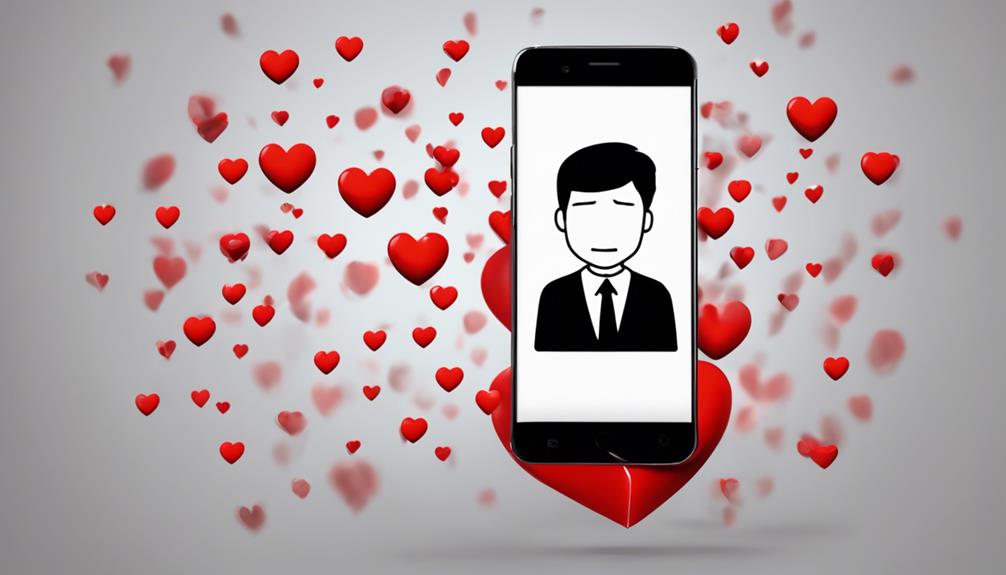
According to research, a large number of people use blocking as a way to stop communication or set boundaries.
Understanding why someone chose to block you can be a perplexing experience, leaving us questioning what led to this decision. Exploring possible reasons behind this action may shed light on the situation, offering insights into potential motivations and emotional dynamics at play.
Let's uncover the intricacies of why he might have blocked you and how to navigate this challenging situation with grace and self-awareness.
Key Takeaways
- Clear and effective communication is crucial to avoid being blocked.
- Building trust through honest conversations can alleviate insecurities and jealousy.
- Acknowledge intense emotions that might lead to blocking and focus on self-care.
- Understand that blocking may indicate loss of interest and focus on personal well-being.
Misunderstanding in Communication
When misunderstandings arise due to miscommunication, individuals may feel compelled to block others as a means of addressing perceived issues. It's essential to recognize that a blocked person might've misunderstood a message or conversation, leading them to take the drastic step of blocking someone. Reasons for blocking can stem from different communication styles or misread cues, resulting in confusion and conflict. In such situations, it's crucial to reflect on our own communication approaches and consider how they might be interpreted by the other person.
To prevent being blocked by someone, practicing clear and effective communication is key. This involves actively listening, seeking clarification when needed, and being mindful of how our words and actions may be perceived. Addressing misunderstandings promptly and openly can help prevent tensions from escalating to the point of blocking. By fostering an environment of understanding and empathy in our interactions, we can cultivate healthier and more positive relationships.
Relationship Insecurity or Jealousy
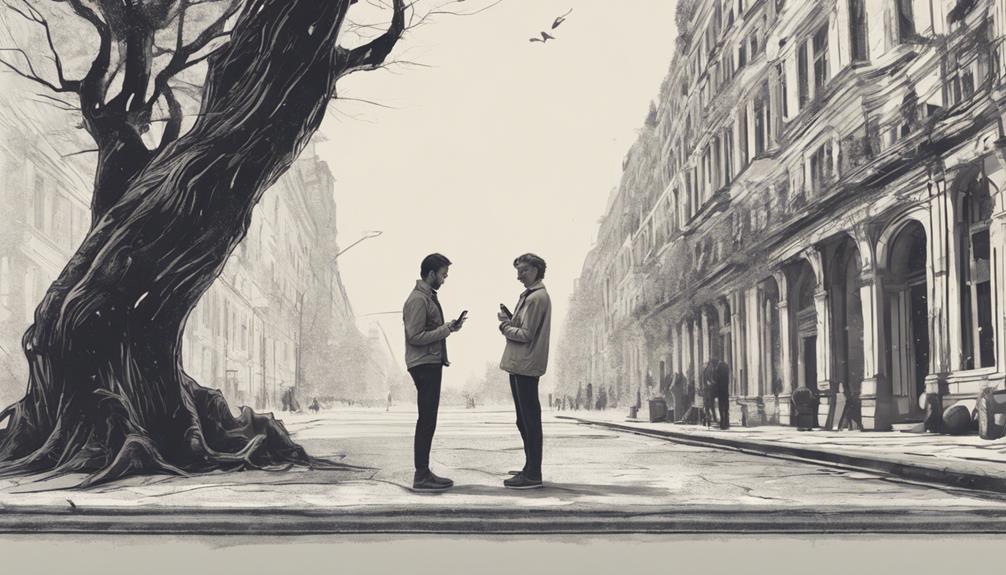
Miscommunication can sometimes lead to misunderstandings that result in one party feeling the need to block the other, but delving into the realm of relationship insecurity or jealousy sheds light on a different motivation for such actions.
When facing issues related to relationship insecurity or jealousy, it's essential to address them with empathy and understanding. Here are three key points to consider:
- Control and Fear: Blocking can be a way for individuals to exert control over a situation that triggers their insecurities. Understanding the underlying fear that drives this behavior is crucial in moving towards a resolution.
- Communication and Trust: Insecurities and jealousy often stem from a lack of open communication and trust in the relationship. Building a foundation of trust through honest conversations can help alleviate these feelings.
- Overcoming Insecurities: Working on personal insecurities is vital in overcoming jealousy-related blocking behaviors. Seeking support from a therapist or counselor can provide valuable tools to address and manage these emotions effectively.
Overwhelmed by Intensity
We understand how overwhelming it can be when emotions run high and interactions become intense.
Sometimes, the depth of feelings or interactions can become too much to handle.
It's important to recognize when the intensity of a relationship becomes emotionally draining and overwhelming, leading to the need for space or blocking communication.
Emotional Pressure Felt
Feeling overwhelmed by intense emotions can often lead to someone deciding to block another person on social media or communication platforms. When emotional pressure mounts in an intense relationship, it can become challenging to navigate the situation.
Here's how to understand and address the emotional pressure felt:
- Recognize His Overwhelm: Acknowledge that intense emotions might've led him to block you.
- Respect His Need for Space: Understand that he may be creating distance to alleviate overwhelming feelings.
- Focus on Self-Care: Take this time to focus on yourself and your well-being to alleviate your own overwhelming emotions.
Intense Interactions Causing
Intense interactions can often lead to feelings of being overwhelmed, potentially causing a need for distance and space in a relationship. When someone feels suffocated or pressured by the intensity of interactions, they may block to create space for themselves.
It's essential to recognize that intense dynamics can be stressful and overwhelming for both parties involved. Understanding this can help in managing overwhelming feelings and giving each other the necessary breathing room.
If he blocked you due to feeling overwhelmed emotionally, it might be beneficial to communicate openly about how to navigate the intensity more effectively. Taking steps to balance the dynamic and respect each other's emotional boundaries can lead to a healthier and more sustainable relationship.
Conflicting Feelings or Emotions
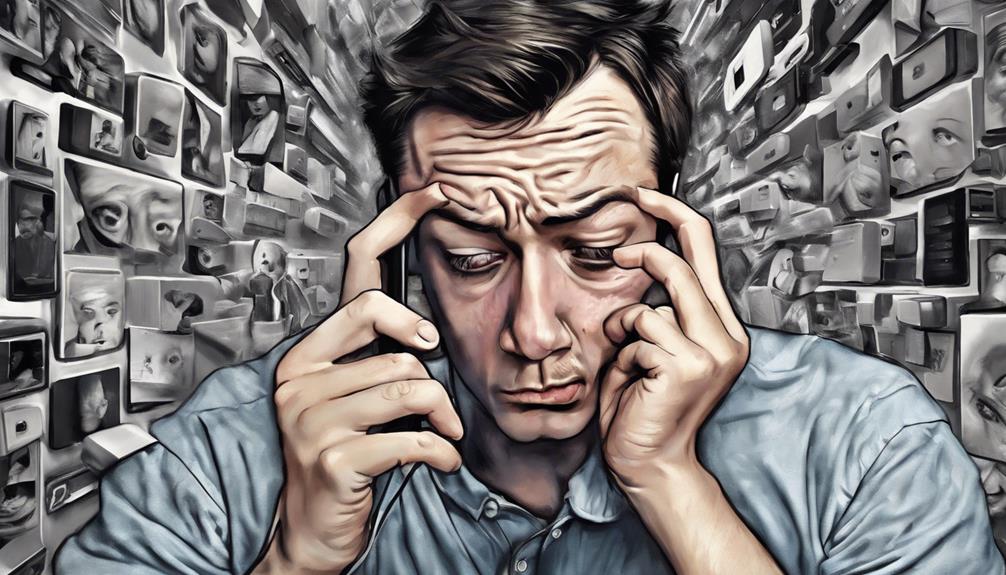
Experiencing internal turmoil can sometimes lead to unexpected actions, such as blocking someone, especially when conflicting emotions are at play. When dealing with conflicting feelings or emotions, it's crucial to approach the situation with empathy and understanding.
Here are some insights into why someone might block you in such circumstances:
- Mixed Signals: He might block you due to receiving mixed signals from you, which can create confusion and conflict in his feelings. It's essential to communicate openly and honestly to avoid misunderstandings.
- Internal Struggles: Internal conflicts like guilt, attraction, or uncertainty can lead him to block you as a way to avoid dealing with these conflicting emotions. Offering support and patience during this time can make a difference.
- Battle Between Heart and Mind: If he's experiencing a battle between his heart and mind, blocking you might be a coping mechanism to manage the conflicting feelings. Providing him with space and understanding can help him navigate through this challenging period.
Loss of Interest or Moving On

Perhaps he's reached a point where his interest has waned or his heart has moved on, prompting the decision to block you. It's tough when someone we care about loses interest or moves on, especially if it catches us off guard.
It's important to remember that people's feelings can change, and it's a natural part of relationships. If he's decided to block you, it could be a way for him to create distance and emotional closure. This action might signify that he no longer sees a future with you, especially if there's been a recent breakup or a shift in his feelings.
While it may be painful to accept, focusing on your own well-being and looking towards the future can help you navigate this challenging situation. Remember that relationships evolve, and sometimes they come to an end, allowing both parties to grow and find new paths in life.
Feeling Offended or Disrespected

Feeling offended or disrespected can sometimes lead to someone deciding to block another person. It's essential to recognize that emotions like feeling hurt or insulted can play a significant role in how individuals interact online.
Here are some insights into why being offended or disrespected could result in being blocked:
- Defensive Response: When someone feels offended or disrespected, their immediate reaction might be to protect themselves. Blocking could be a defensive response to shield oneself from further perceived harm.
- Perceived Offense: Sometimes, what one person says or does mightn't seem offensive to them but can be perceived differently by the other party. This perceived offense can create a rift that leads to blocking.
- Feeling Triggered: Emotions can run high in online interactions, and if someone feels triggered by a particular comment or action, they may choose to block the source of that trigger to maintain their emotional well-being.
Understanding these dynamics can help navigate situations where feeling offended or disrespected has led to being blocked.
Seeking Control or Power Dynamics
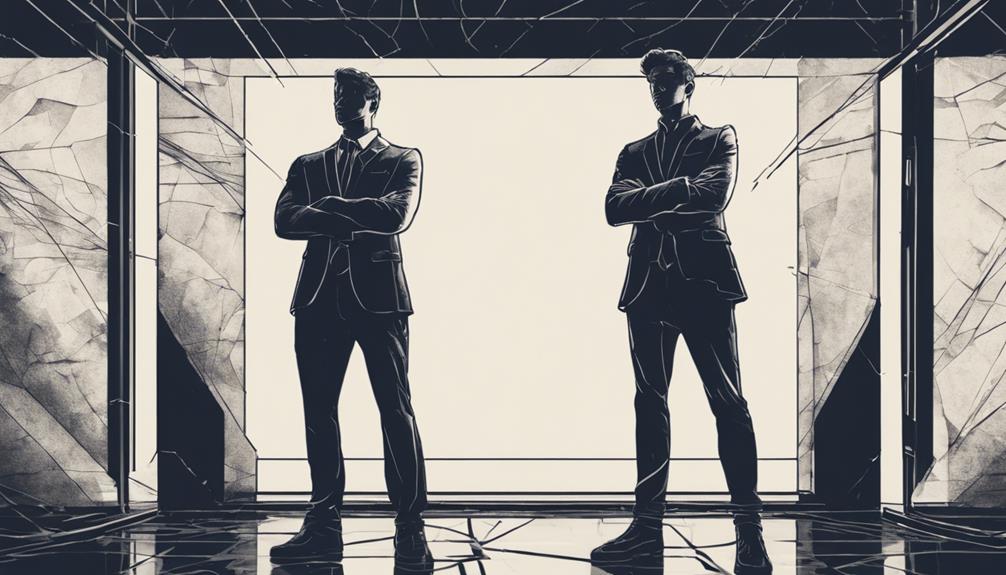
After recognizing how feeling offended or disrespected can lead to being blocked, it becomes crucial to understand how seeking control or power dynamics may also play a significant role in such situations. When someone blocks you, it could be a way for them to assert control or power in the relationship. This behavior may stem from a desire to set boundaries or establish dominance, often driven by feelings of insecurity or a need for emotional leverage. Understanding these power dynamics is essential to navigate through such challenging situations.
| Seeking Control or Power Dynamics | |
|---|---|
| Key Points | Implications |
| Blocking for control | Indicates desire for dominance |
| Establishing boundaries | Setting limits in the relationship |
| Insecurity and emotional leverage | Using blocking as a power tool |
| Manipulation in power dynamics | Influence through control tactics |
Seeking Clarity or Resolving Confusion

Seeking clarity amidst the confusion surrounding a block can pave the way for understanding and closure in the situation. When trying to unravel the reason behind a block, it's important to engage in open and honest communication to address any misunderstandings that may have occurred. Self-reflection plays a crucial role in this process, allowing us to assess our actions and responses that could have contributed to the situation.
Here are three practical steps to help you navigate through seeking clarity and resolving confusion:
- Reflect on past interactions: Take time to reflect on previous conversations or incidents that might've led to the block. Identifying potential triggers can provide insight into the situation.
- Seek input from a trusted friend: Reach out to a friend or confidant who can offer a different perspective on the situation. Their insights can help you gain clarity and see things from a different angle.
- Clarify through communication: Initiate a respectful and open conversation with the person who blocked you. Clear communication can help address any misunderstandings and pave the way for closure.
Lack of Romantic Interest
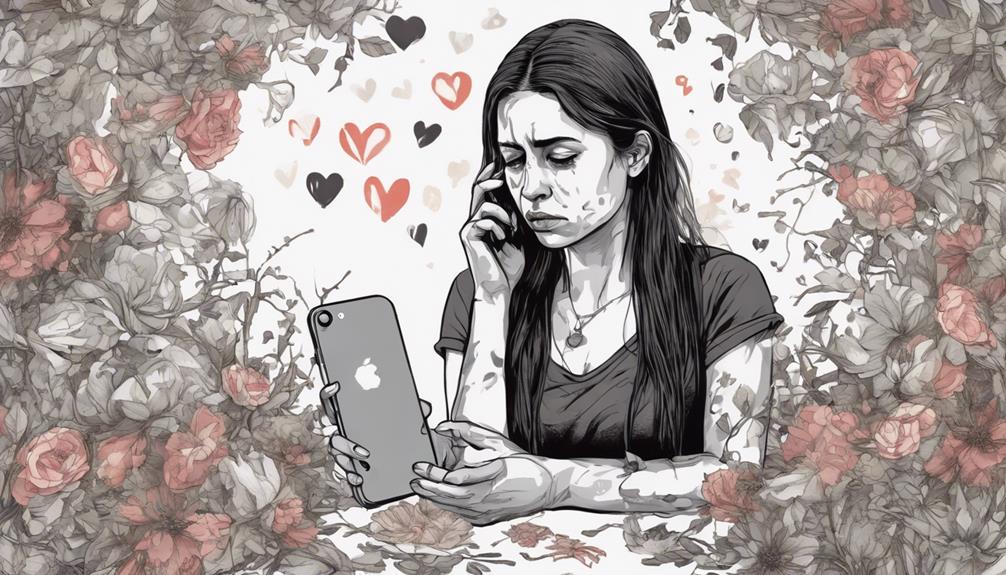
We've all been there – when someone we like doesn't reciprocate those feelings. Mixed signals can be confusing, especially when it comes to differing relationship goals.
Communication breakdowns might've led to misconceptions about each other's intentions.
Mixed Signals Received
When navigating mixed signals in a potential romantic connection, understanding that these ambiguous messages may indicate a lack of romantic interest can be crucial for moving forward respectfully and with self-awareness.
- Recognize the signs: Mixed signals like hot and cold behavior, inconsistency, or lack of effort may reveal a lack of genuine interest in a romantic relationship.
- Respect boundaries: If he's blocked you or is creating distance, it's important to accept his signals of disinterest and not push for something that isn't reciprocated.
- Focus on mutual connections: Instead of dwelling on mixed signals, consider investing your time and energy into relationships where there's clear and mutual romantic interest.
Different Relationship Goals
Understanding that differing relationship goals can often be a key factor in someone choosing to block you, it's important to acknowledge and respect these differences to navigate the situation with understanding and maturity.
When there's a lack of romantic interest or mutual attraction, it can lead to being blocked. Sometimes, one person may see the relationship as only friendship, while the other desires something more, causing confusion and a sense of disconnection.
It's crucial to realize that everyone has their own priorities and reasons for their actions. If he blocked you due to differing relationship goals, it might be a clear sign that the romantic interest isn't mutual.
Communication Breakdown Issues
In relationships, struggling with communication breakdown issues can often be a telling sign of a lack of romantic interest on his part.
- Inconsistent communication or unresponsive messages may indicate disinterest in pursuing a relationship.
- Avoiding personal conversations could signal a lack of emotional investment in the connection.
- Ignoring attempts at communication or showing a general lack of effort in maintaining contact might suggest a diminishing interest in building a romantic bond.
If you find yourself facing these signs, it's essential to acknowledge the possibility of his disinterest. While it may be challenging, focusing on your own well-being and considering a conversation to clarify his feelings could provide the closure needed to move forward positively.
Desire for Apology or Closure

Addressing the need for apology or closure can be a crucial step in navigating the situation after being blocked. It's possible that he blocked you because he's seeking closure from a past hurtful or upsetting situation, and an apology could be the key to resolving it. His act of blocking might be a way of prompting you to reach out and address the issue, showing that he desires resolution.
Understanding his need for closure or an apology can guide your next steps and help you decide on the best course of action. If you feel that an apology is warranted, consider reaching out in a sincere and empathetic manner to express your regret and willingness to make amends. Taking the initiative to offer closure or apologize can demonstrate maturity and a genuine concern for the other person's feelings, potentially opening the door to resolving the situation amicably.
Frequently Asked Questions
What to Do After a Guy Blocks You?
After a guy blocks you, it's important to respect his decision. Give him space and focus on self-care. Reflect on the relationship. Seek support from friends or a therapist for guidance. Remember, healing takes time.
How Do You Deal With a Man Who Blocked You?
We respect his choice to block us and focus on self-care. Giving space and refraining from contact is crucial. Reflecting on the relationship helps us learn and seeking closure through healthy communication when possible is valuable for our growth.
What It Means if a Guy Blocks You?
Being blocked by a guy may signal strong emotions like anger, boundaries, or self-protection. Understanding these emotions can guide next steps in communication or closure. It's crucial to approach the situation with empathy and clarity.
How Do You Respond to Why Did You Block Me?
When asked why we were blocked, we respond honestly and respectfully. Understanding the reasons behind actions fosters growth and awareness. It's important to approach such conversations with openness and a willingness to learn from the experience.
Could His Girlfriend’s Influence Be a Reason Why He Blocked Me and What Should I Do About It?
It’s tempting to consider the possible explanations for talking. Perhaps his girlfriend felt threatened or insecure, prompting him to block you. However, jumping to conclusions won’t help. Instead, communicate openly with him and express your concerns. Ultimately, it’s crucial to respect his boundaries and decisions.
Conclusion
As we navigate the murky waters of blocked connections, let's remember that each block carries a deeper meaning, a hidden message waiting to be unraveled.
Let's tread lightly, with open hearts and minds, ready to embrace the lessons and growth that come our way.
In the silence of being blocked, we find the space to reflect, heal, and emerge stronger than before.
Let's cherish this moment of transformation and trust in the journey ahead.
Augustus is the visionary leader and Editor-in-Chief of Personality-Test.net. With an unwavering commitment to quality and authenticity, he oversees all content, ensuring it enlightens and empowers our audience. Augustus believes deeply in the transformative power of self-awareness and is dedicated to making Personality-Test.net a beacon for those on a journey to understand themselves better.
Relationships Insights
Do Guys Stare at Me but Never Smile? Here's What You Should Know
Lurking beneath the surface of unsmiling stares lies a multitude of intentions—discover the hidden motives that keep you guessing.

Do you ever notice how some guys appear to stare without ever smiling?
It's a common scenario that can leave us feeling puzzled or uneasy.
Understanding the reasons behind this behavior is crucial, as it can range from innocent curiosity to more concerning intentions.
By delving deeper into the dynamics of male gaze and non-verbal communication, we can unravel the mystery behind their unsmiling stares and learn how to navigate such situations with confidence and clarity.
Key Takeaways
- Unsmiling stares may stem from cultural differences, personal struggles, or social norms.
- Male gaze behavior can make women feel objectified or uncomfortable.
- Respond assertively, set boundaries, and prioritize safety when faced with unsmiling stares.
- Genuine interest is shown through consistent eye contact, engagement, and active conversation.
Reasons Behind Their Unsmiling Stares
Understanding why guys may stare without smiling provides valuable insights into their behavior patterns and emotional dynamics. When a guy stares without smiling, it can stem from various reasons, including cultural differences, personal struggles, or social norms. Some individuals, especially those who are shy or introverted, may find it challenging to express themselves openly, leading to prolonged eye contact without a smile. In certain cultures, maintaining a neutral facial expression is considered respectful, which can be misinterpreted as disinterest or aloofness.
Body language cues play a significant role in deciphering the intentions behind unsmiling stares. While it can be uncomfortable when someone stares without a smile, it's essential to consider the context and individual factors before jumping to conclusions. For some guys, staring without smiling could be a sign of interest or deep contemplation rather than a lack of engagement. By being mindful of these nuances and approaching the situation with empathy, we can better understand and navigate these interactions to foster clearer communication and mutual understanding.
Understanding Male Gaze Behavior

Often overlooked in daily interactions, the male gaze can significantly impact how men perceive women in various contexts. Staring without smiling, a common behavior associated with the male gaze, can sometimes lead to women feeling objectified.
It's important to recognize that reasons behind unsmiling stares can vary; shyness, fear of rejection, or lack of confidence might be factors inhibiting a more friendly approach. In these situations, setting boundaries and engaging in effective communication are crucial for navigating discomfort.
Additionally, it's essential to understand that staring behavior can stem from various intentions such as curiosity, observation, admiration, or cultural influences. By being aware of these dynamics, both men and women can work towards creating more respectful and understanding interactions.
How to React to Unsmiling Stares
As women navigating encounters with unsmiling stares, it's important to trust our instincts and respond assertively to prioritize our safety and comfort. When faced with a guy staring without a smile, it's crucial to acknowledge the stare with a quick glance and then look away to set boundaries and show discomfort. If the staring persists and makes you feel uncomfortable, trust your instincts and consider removing yourself from the situation.
Pay close attention to body language and other signs of interest beyond just a smile to better understand the guy's behavior. Remember, context plays a significant role in interpreting the intentions behind the staring without a smile accurately. If you feel unsafe or uneasy, prioritize your safety and comfort by addressing the issue politely and assertively.
Signs of Genuine Interest

Showing genuine interest can manifest in various ways beyond just a smile, such as consistent eye contact and attentive body language cues. Genuine interest can be indicated through various signs that show someone is invested in getting to know you better. One key sign is maintaining eye contact without the need for a smile, as this demonstrates a focus on you and the conversation at hand. Additionally, paying attention to body language cues like facing towards you and using open gestures can suggest a genuine desire to engage with you. Remembering details about your life or previous conversations, asking questions to learn more about you, and actively engaging in conversation are all strong indicators of sincere interest. Furthermore, if someone consistently seeks to spend time with you, shows care, and pays attention to your needs, these actions can signify genuine interest in building a connection with you.
| Signs of Genuine Interest | ||
|---|---|---|
| Eye contact | Body language cues | Remembering details |
| Asking questions | Engaging in conversation | Spending time together |
Dealing With Uncomfortable Situations
Navigating uncomfortable situations where someone stares without smiling can be challenging, but setting boundaries and trusting your instincts are crucial steps in ensuring your safety and well-being.
When faced with such discomfort, here are some strategies to help you deal with the situation effectively:
- Acknowledge the stare: A quick glance in their direction can subtly communicate your awareness of their gaze, setting a boundary without escalating the situation.
- Trust your instincts: If the staring persists or makes you feel unsafe, listen to your gut feelings and remove yourself from the situation. Your safety and well-being are the top priority.
- Consider the context: Understanding the setting and any other cues can provide valuable insights into the individual's intentions. Pay attention to body language and other signs of interest beyond a smile to gauge the situation accurately.
Frequently Asked Questions
Why Does He Look at Me but Not Say Anything?
When someone looks without speaking, they might feel hesitant, unsure, or simply observing. It's common for people to have various reasons for not initiating conversation immediately. Approaching with kindness can lead to understanding.
Why Do Guys Always Stare at Me but Never Talk to Me?
Sometimes silence speaks volumes. Those unspoken words in a gaze may hold tales of admiration, shyness, or contemplation. Understanding their silence could unravel mysteries or reveal admiration, hidden beneath timid smiles.
What Does It Mean When a Man Stares at You Without Smiling?
When a man stares without smiling, it can convey interest, curiosity, shyness, or even attraction. Understanding context, cultural nuances, and individual differences is key to interpreting intentions accurately. Initiating a conversation may reveal more.
What Are Guys Thinking When They Stare at You?
When guys stare, they might be pondering, admiring, or just lost in thought. It's a mystery until we engage. Initiating a chat unveils the truth. Their gaze might hold more than meets the eye.
Is an Unexpected Cheek Kiss a Sign of Interest from Guys Who Stare but Never Smile?
Have you ever wondered if an unexpected cheek kiss from a guy who stares but never smiles is a sign of interest? In this unexpected cheek kiss article, we’ll discuss the nuances of this behavior and whether it indicates romantic interest or something else entirely.
Conclusion
So, next time guys stare at you without smiling, remember, they're probably just planning to build a shrine in your honor!
In all seriousness, understanding their reasons and reacting with confidence and assertiveness is key. Trust your instincts, set boundaries, and prioritize your comfort above all else.
You deserve to feel respected and valued, so don't hesitate to address any uncomfortable situations with grace and strength. You've got this!
Augustus is the visionary leader and Editor-in-Chief of Personality-Test.net. With an unwavering commitment to quality and authenticity, he oversees all content, ensuring it enlightens and empowers our audience. Augustus believes deeply in the transformative power of self-awareness and is dedicated to making Personality-Test.net a beacon for those on a journey to understand themselves better.
-

 Self-Understanding3 months ago
Self-Understanding3 months agoUnderstanding DMCA Protections & Compliance
-

 Relationship Dynamics3 months ago
Relationship Dynamics3 months agoCan a Man Truly Love His Side Chick
-

 Enneagram of Personality1 week ago
Enneagram of Personality1 week agoEnneagram Test: Printable Version for Easy Self-Discovery
-

 Personality Exploration2 weeks ago
Personality Exploration2 weeks agoDiscover Your Traits with Atomic Habits Personality Test
-

 Personality Exploration3 months ago
Personality Exploration3 months agoDOPE Personality Test Explained: Traits & Types
-

 Personality Exploration3 months ago
Personality Exploration3 months agoAlpha Beta Omega Sigma Female Personality Quiz
-

 Personality Exploration2 weeks ago
Personality Exploration2 weeks agoAlpha Beta Omega Personality Test Explained
-

 Self-Understanding2 months ago
Self-Understanding2 months agoDiscover Your Traits with Our Personality Test
